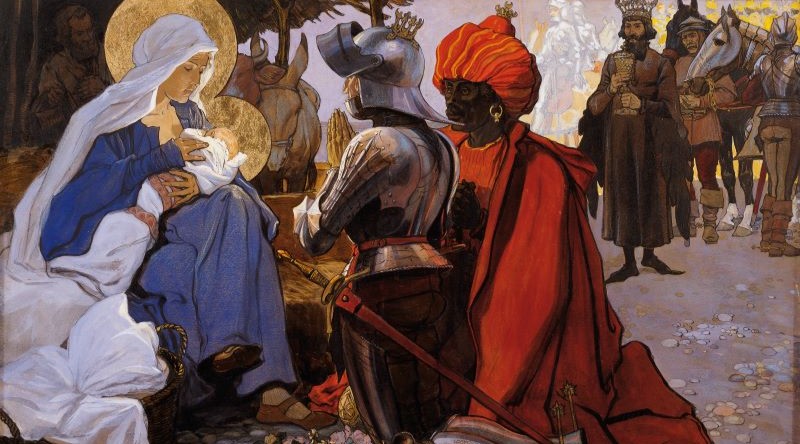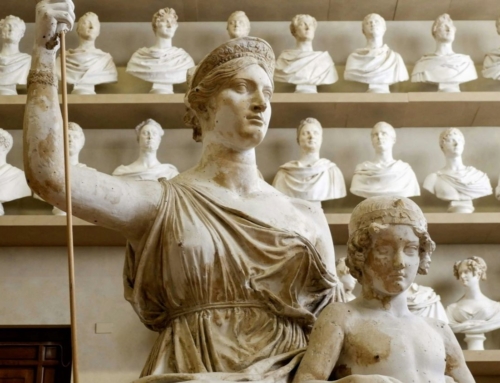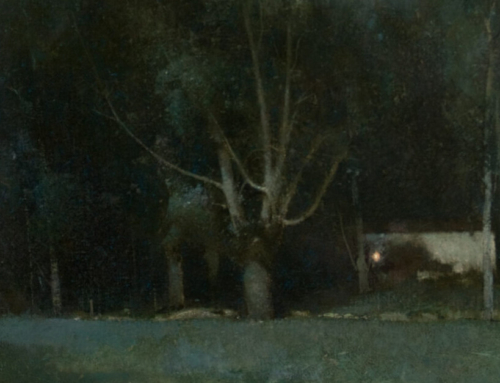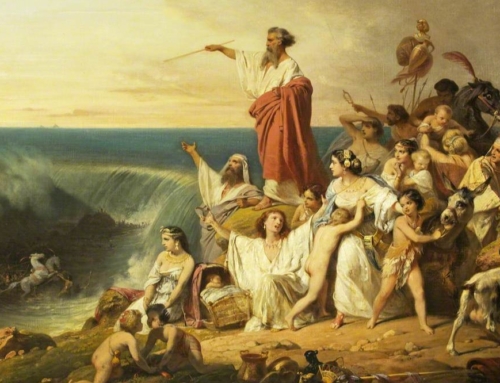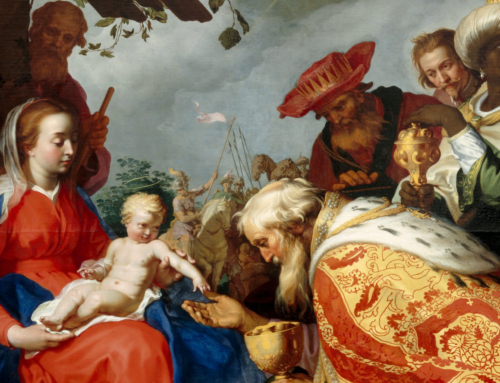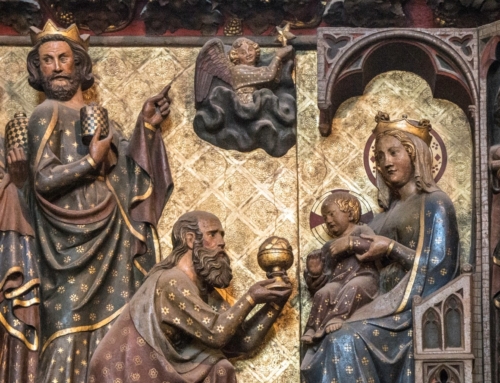The feast of the Epiphany was traditionally always celebrated on January 6, twelve days after Christmas. The poem offered here is a reflection on the humility that man is faced with—that even kings were faced with—on approaching the manger of the Lord. As the popular carol goes, “What can I bring him, poor as I am?” Gold itself cannot even do, for “the gold has grown dim, the purest gold” (Lam 4:1). The gifts we offer to God could never be sufficient because we are not sufficient. Nevertheless they are accepted by the King of Kings, who deigned, for love of us, to wear not a crown of gold, but a crown of thorns.
A golden age, I’ve heard these days be called,
When lights from Roman lamps reach to all lands,
And back to that Great Mother, noble-walled,
Reflects that dimmer light concord demands.
So darker do all currents seem to flow.
But I, illustrious bright,
Know what it means for light
To give true pow’r of sight by lumened strands.
I, like stars, forth from and by myself do glow.
Within, within I bear
Refulgent radiance rare,
And choose whome’er I deem the man or god
Best-matched to fit my mien,
And, be it king or queen,
I’d bow and give myself for wreath and rod.
In rich, black earth I found
Myself at first, in peaceful veins of ease,
Bdellium, my neighbor in the ground,
And onyx stone: my friends beneath the trees—
Below the roots of these
We were content as seeds in Paradise.
But, then, in Havilah, down-river-wise,
The rumor came, the fools had failed and lost
The sundry gifts they had as free and without cost.
Their dreams thus westward sailed to open seas,
While they e’er eastward trudged and passed above,
And sobs I heard, as like the mourning dove
Who cannot find his love.
Not long after did I see the light of day:
A blist’ring sun that showed me not to decay—
What was divorce to be ripped out from idyll
Proved soon a wedding nuptial.
So from Edenic mines I came thus forth
To brighten lands of empire from south to north,
And west to east, where I would be of worth;
Deserved I, thus, to bear
Refulgent radiance rare,
And choose whome’er I deemed the man or god
Best-matched to fit my mien,
And were it king or queen
I’d bow and give myself for wreath and rod.
The necks of goddesses I draped about,
And matrons less I’d flout.
In Grecian halls I plastered high the walls,
Bestowing virtue to the thralls
Of potentates despotic; to Nestor
And to nobler kingships offered other
Decoration. To Colchis Jason sped
To find my ovine fleece,
And Heracles from the Hesperides
Stole three shining apples for to appease
The nemesis Eurystheus. And calm on
Reposing Agamemnon
Did I immortalize his fame:
The effigy,
Which down the years communicates his name,
Shaped by me.
I formed Apollo’s chariot,
The thunder god’s gift, aureate.
Another father’s son I held
When Hector, felled
By swords, was placed by Priam gravely
Inside my urn.
Still, I could not turn the disconcerting yearn
And from Hellenic shores I wandered
To still more antique lands and courts;
Here (I said) I’d find the key,
To dispatch mortality
And brighter grow through darker sports.
Pharaohs’ hearts I’d weigh,
And did. Anubis worked his task:
A terrifying thrill to judge the lords
Whose scepters were the staff of Ra.
Whose faces shewed no speck or flaw
When I enshrined them with a mask.
Among the hordes of squandered
Slaves, though, I grew sick—the bee
And sedge for all their secrets were not sunny.
I e’er craved a sweeter honey,
Not extracted with an infant-slayer’s swords,
But more singular yellow buds to flash.
Adorning soldiers’ greaves,
Or filling dreams of thieves
Would do, to leave this realm of scarabs and to dash
From Africa to more acanthine scenery,
Where mighty men, first driven, then shriven
Heavenward without machinery
Heaped their hopes. But from the same heav’n word was given
They should their designs discard
And so diff’rent tow’rs were raised, where smell of nard
And spice wafted down the slopes.
I hung among the ropes
And vines of purple stuff
In Babel. The gardens and the palaces!
I covered all the terraces;
Marduk I did clothe in Babylon’s
Abode, and worship did I win on Dagon’s
Lavish idol.
A new idyll
I had found (I thought), though ever on the heads
Of kings or demigods, I was not set:
I knew the weakness in their deeds. There grew up weeds
In all those harems of brunette and silver.
So I wandered ever
From the Indus
To the Bosporus.
But just as Occidental climbs
Won me not,
So the rhymes
Of fading glory proved a blot.
Eastern pleasures, for all the best,
I still would not content,
Just like the scabbard or sarcophagi;
But sages and the genii
Knew my unrest.
And down the years my plans of empire went;
I’ve ceased to look for that ne’er coming advent.
For deep within I bear
Sufficient radiance rare,
And how could I e’er deem a man or god
Best-paired to fit my mien?
And, whether king or queen,
I doubted one would earn my wreath and rod.
Three savants of wise arts,
Three men have traced their way, with me, about
Like Ishmaelites, on camels laden down
With balm and resin, and me (and I thought
Their worth less), and to a town
We now arrive, dilapidated, small.
Say now, what point have we, us, gifts of kind
So fine and rare in these deserted parts,
These homes of rock-hewn stone
Into which light ne’er shone?
And then, and there, I saw an awesome light.
The past was glimmer, all!
The gleaming of this stall
Now shone seven times as bright.
A man, a maid, an ox, a sheep, an ass.
To what court of strange array have I been brought?
Is here the king I sought?
I see before my eyes a sheen of higher class
Which sets me right aware
Of just how dim my wear
Really is.
Behold this babe, a man yet very God,
More comely than my mien,
This king nursed by a queen.
I give myself, though naught, for wreath and rod.
✠
Image: Maximilian Liebenwein, Die heiligen drei Könige

